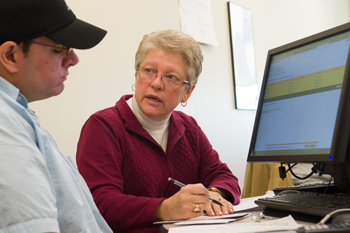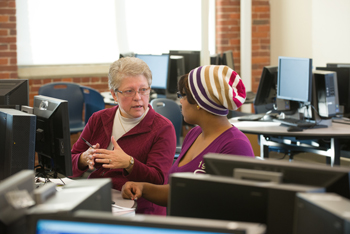Math Pathway Changes Add Up

Linda Murphy, NECC curriculum coordinator for Developmental Mathematics
“There is a national study,” says Linda Murphy, NECC curriculum coordinator for Developmental Mathematics, “that says the more developmental math classes students have to take, the more likely they will drop out. Most programs require math to graduate, so if the students are not successful with their math class, it is likely they will not stay in college to attain a degree.”
To remedy this, while ensuring that students have the proper math skills, NECC math faculty created two new pathways for developmental students. Both are intended to reduce the number of math courses students must complete. For some, this moves them closer to completing their degree or certificate in fewer semesters.
All students entering Northern Essex Community College must complete a math assessment test and place into one of three developmental levels or at the college level.
“These new programs shorten the math pathway for some students, but at the same time prepare them more effectively for the college level math course required in their program of study,” says Murphy.
One change is similar to what has been implemented at other community colleges. NECC students who place into Basic Math or Basic Algebra I can take the course in a modularized format that allows them to advance at their own pace.

Linda Murphy instructs an NECC student in the Riverwalk computer math lab
“Some need the extra time, some do not, but in this way, we can accommodate all students,” says Murphy.
NECC began offering the modular math program in the fall of 2011. It was so successful additional sections have been added every semester since.
Modularized sections meet 4 hours each week in a computer lab. Students work on each lesson, watch a video lecture, complete an assignment in the online program MyMathLab, demonstrating what they have learned in a workbook. After each lesson they are tested using MyMathLab. The math instructor provides assistance where needed.
The other change was to create a Mathematical Literacy for College Students (MLCS) course as an alternative for students who have completed Basic Math. Students who complete MLCS can go directly into college- level math courses such as Statistics, Quantitative Reasoning, or Mathematical Ideas, as required by their academic program.

NECC Riverwalk computer math class
In addition, Sullivan is currently instructing NECC math teachers on how to teach the MLCS course.
A trial section of MLCS was offered at NECC this semester (fall 2012) and there will be at least five sections offered in spring 2013.
“We are here to address the needs of our students and to help them succeed so anything we can do to help is paramount,” Murphy says. “Whatever works for students is what they need to be doing. Everyone learns differently and these course options address all learning styles.”






